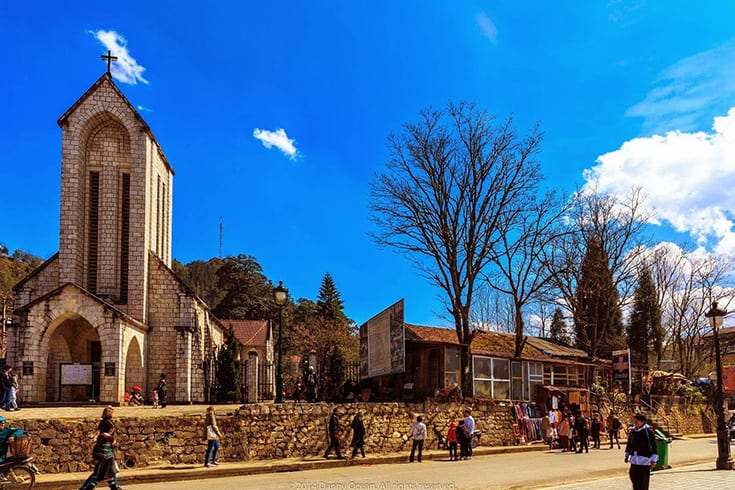Ha Long Bay
– Charming Natural Scenery
– World Cultural Heritages
– Hospitable Local People
– Unique Cuisine
– Safe Security

Certain times of the year tend to attract more travelers to Vietnam during the tourism season because they provide the best amenities, services, and weather.
"The best time to visit the beaches in Central Vietnam would be from February to June, before the summer hordes come, depending on your preferences for where and when to travel. On the other side, if you wish to go trekking in the mountains, the best tourist season is from October to March."
It is important to remember that the weather in Vietnam might change suddenly when traveling. The nation spans 1650 kilometers from north to south, from steep mountains in the north to the flat tropical wetlands of the Mekong Delta. Throughout the winter, Northern Vietnam will experience freezing temperatures and chills. Alpine locations like Sapa may have snowfall from December to February, while delta areas experience temperatures of about 25 °C.
July and August are for beach lovers
The hottest peak season from July to August is the busiest time of the year for tourists visiting Vietnam, as the weather is ideal for the country's coastal beaches.
In contrast, the other months in Vietnam are generally warmer and more humid. The hot, sunny days will end with summer showers and even occasional storms at sea. Therefore, the remaining months are not considered the ideal time for beach tourism when trails can become wet and beaches are rainy.
During the festival season in the 7th lunar month, Vietnam celebrates the Vu Lan festival, an important Buddhist holiday honoring and remembering one's parents and ancestors.
Traveling from April to June or from September to November
To avoid traveling during the peak season, international tourists can choose to visit Vietnam from the dry and cool winter season to the hot and humid summer season. From April to June and from September to November, the weather is usually unpredictable but rarely extreme. Tourists can experience sunny days, but there will also be rainy days, so it's best to prepare for both dry and wet weather conditions.
Traveling during the transitional months can be the best time to avoid crowds at popular attractions, save money, and explore different regions of Vietnam, as the weather is not too bad anywhere.
Meanwhile, the period from October to November will be very favorable for exploring the islands and rocky outcrops around Halong Bay, especially the quieter and less commercialized areas like Bai Tu Long Bay. The weather here also records more dry days than wet ones and has a mild temperature.
Some special festivals are also often held in Vietnam. In Hue, the Hue Festival, usually held periodically every 2 years, will bring the historic imprint of the city through colors, music, and lights in April, May, or June, while the Nha Trang Sea Festival brings a party atmosphere in June.
In addition, Vesak Day in May will be the best experience in Ninh Binh or Ho Chi Minh City. Or those passionate about fireworks can visit Da Nang in June (or sometimes July) to attend the captivating Da Nang Fireworks Festival.
And certainly, come to Hanoi on Vietnam National Day (September 2nd) to enjoy the lively atmosphere at the historic Ba Dinh Square.
During the Mid-Autumn Festival in September or October, delicious festival foods from Vietnam also appear everywhere. Other festivals, such as the dragon boat racing festival on the waterways of the Mekong Delta or the Khmer Ok Om Bok Festival, also attract a large number of tourists and local residents to participate.
Traveling to Vietnam during the typhoon season
Typically, the typhoon season in Vietnam poses the greatest risk of major storms from August to September. On average, the country experiences 4-6 typhoons per year, characterized by heavy rain and strong winds. Occasionally, severe typhoons can lead to flooding and disruptions to transportation, impacting both air and sea travel.
The areas most heavily affected by typhoons are the southern and northern coastal regions (including Halong Bay). The weather tends to be most severe near the coastline; inland, there may be unusually heavy rain and power outages.
"This is a time when travelers need to be particularly cautious but not panicked - keep an eye on weather forecasts and prioritize land-based activities over boating, swimming, and diving," advises author Joe Bindloss for tourists considering visiting Vietnam during typhoon season.
0 Comment 0 Likes 0 Views
0 Comment 0 Likes 0 Views
0 Comment 0 Likes 0 Views
0 Comment 0 Likes 0 Views
0 Comment 0 Likes 0 Views
0 Comment 0 Likes 0 Views